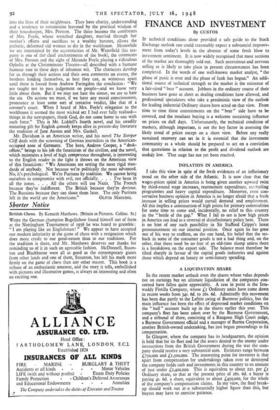FINANCE AND INVESTMENT
By CUSTOS
IF technical conditions alone provided a safe guide to the Stock Exchange outlook one could reasonably expect a substantial improve- ment from today's levels in. the absence of some fresh blow to investment sentiment. It is now widely recognised that most sections of the market are thoroughly sold out. Such necessitous and nervous selling as is likely to take place in present Circumstances has been completed. In the words of one well-known market analyst, "the phase of panic is over and the phase of funk has begun." An addi- tional source of technical strength to the market is the existence of a fair-sized " bear " account. Jobbers in the ordinary course of their business have gone as short as dealing conditions have allowed, and professional speculators who take a pessimistic view of the outlook for leading industrial Ordinary shares have acted on that view. From time to time these commitments on the " bear " side have to be covered, and the resultant buying is a welcome sustaining influence on prices on dull days. Unfortunately, the technical condition of markets, although important, is not the key factor in assessing the likely trend of prices except on a short view. Before any really sustained recovery can set in it is essential that the investment community as a whole should be prepared to act on a conviction that quotations in relation to the profit and dividend outlook are unduly low. That stage has not yet been reached.
INFLATION IN AMERICA
I take this view in spite of the fresh evidences of an inflationary trend on the other side of the Atlantic. It is now clear that the wages-prices spiral in America is being given another upward twist by third-round wage increases, rearmament expenditure, stc :knifing programmes and heavy capital expenditure. Moreover, even con- servative business opinion in America is no longer afraid that a fresh increase in selling prices would curtail demand and employment. All this implies a continuation of high prices for primary commodities for some time to come and, incidentally, no relief to this country in the "battle of the gap." What I fail to see is how high prices in America can lead to a reversal of disinflationary policy here. There is no hint of any such possibility in Sir Stafford Cripps's latest pronouncement on our internal position. Once again he has gone out of his way to reaffirm, on the one hand, his belief that the set- back in some of the consumer goods is not a bad thing and, on the other, that there need be no fear of an old-time slump unless there is a breakdown, on the export side. The balance must therefore be tilted sharply in favour of the capital goods industries and against those which depend on luxury or semi-luxury spending.
A LIQUIDATION SHARE
In the recent market setback even the shares whose value depends not on earnings but on ultimate liquidation of the companies con- cerned have fallen quite appreciably. A case in point is the Irra- waddy Flotilla Company, whose Li Ordinary units have come down in recent weeks from 34s. 6d. to 26s. 6d. Admittedly this movement has been due partly to the Leftist swing of Burmese politics, but the main influence has been the effect of depressed market conditions on the " bull " account built up in the shares earlier this year. This company's fleet has been taken over by the Burmese Government, and a tribunal of three, consisting of a Rangoon High Court judge, a Burmese Government official and a manager of Burma Corporation, another British-owned undertaking, has just begun proceedings to fix compensation.
In Glasgow, where the company has its headquarters, the opinion is held that for its fleet and for the assets denied to the enemy under instructions from the British Government during the war the com- pany should receive a very substantial sum. Estimates range between £75o,000 and £1,500,000. The interesting point for investors is that apart from compensation for undertakings taken over or destroyed the company holds cash and investments in this country to an amount of just under £2,400,000. This is equivalent to about 22s. per £i Ordinary share, so that at the present price of 26s. 6d. a buyer is paying 4s. 6d. a share, equivalent to about £45o,000, for the whole of the company's compensation claims. In my view, the final break- up should work out at -a substantially higher figure than this, but buyers may have to exercise patience.


































 Previous page
Previous page